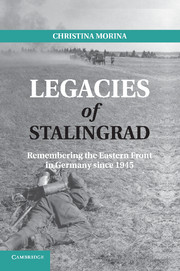6 - The Past Revisited
West German Memory of the Eastern Front in the Era of Détente
Published online by Cambridge University Press: 07 October 2011
Summary
I always had a good personal relationship with Brezhnev … ; it probably rested on the fact that we both had experienced the war directly as soldiers. We knew each other’s war experiences because we had talked about them; we learnt from one another that we both hated war, and it was not just that I feared a new war, but Brezhnev did too. Brezhnev was not an enemy but a respected opponent whom I understood on a human level.
Helmut Schmidt (1996)It is often claimed that the end of the Adenauer era inaugurated a new phase in West German Vergangenheitsbewältigung. After a transitional phase under chancellors Ludwig Erhard and Kurt-Georg Kiesinger, historians have pointed to Willy Brandt’s chancellorship and the legacy of the 1968 movement as turning points in the political culture of the Bonn republic. With that change in political culture, scholars have also noted transformations in the “public use of history.” By publicly communicating a more “empathic understanding of historical truth,” which opened West German memorial culture to the sufferings of Nazism’s non-German victims, the new generation of politicians emerging with Brandt created a crucial precondition for “forgiveness and social peace.” It was a milestone on the road towards the full “normative internalization” of the Nazi past into West German memory. In the long run, National Socialism was “overcome” because it was the historical event of reference (Bezugsereignis) that had kept the “greatest relevance for the self-reflection of the political system.”
- Type
- Chapter
- Information
- Legacies of StalingradRemembering the Eastern Front in Germany since 1945, pp. 193 - 230Publisher: Cambridge University PressPrint publication year: 2011



